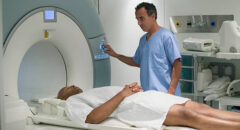
"Why are you like this? Montel [Williams] isn't, he's walking. Maybe you need to change doctors." For 63-year-old Norma Williams-Burkes of North Carolina, comments made to her like this one fuel her desire to educate African Americans about what it really means to live with multiple sclerosis (MS).
In her own words, this is Norma's story.
My symptoms first appeared in 1995. After waking, I couldn't get out of bed. My body began to stiffen more. I was diagnosed and treated for arthritis.
Beginning in April 1999, my once cheerful, outgoing life began changing. Waking each morning, my first thought was "Will 'old Arthur' (my reference to arthritis) keep me in bed today?"
After numerous visits to different doctors, taking every lab test you can name, having surgeries I didn't need, and a major MS attack in August 2003 while driving that hospitalized me (I didn't know what was happening with my body then), I was finally diagnosed with Progressive Multiple Sclerosis (PMS). According to my doctor, Emily Pharr, MD, there isn't any specific medication for this form of MS.
Once diagnosed, I began to realize the steady progression of MS, and the affects it was having on my body. True, this was a hard pill to swallow. Slowly, things I took for granted (daily hygiene, dressing and feeding myself, standing, walking, rising from chairs, driving, working, holding objects, etc.) became harder to perform. I never wanted to admit then, and still don't today, the active life I enjoyed was ending.

My life with MS became a stalled journey.
My mom, until her health began to decline, became my primary caregiver. When she couldn't do it anymore, my only child gave up his career to take over where my mom left off. It's not an easy life for neither me nor him.
He's not only my caregiver, but also my eyes. With limited mobility, he oversees daily activities dealing with me and our home. He's my ears. Being hearing impaired, he assists or handles my communication with others.He's my hands. I sometimes have difficulty managing simple tasks and he steps in to help. And he's and my feet. He's there to keep things moving inside and outside the home.
For me, depending on others for assistance sometimes causes mood changes. For my son, it's affecting him emotionally, seeing me in this condition, and physically, lifting me is taking a toll on his body. However, he refuses to put me in a nursing facility, which I'm thankful. Family and friends help when possible.

Staying connected with the outside world and keeping updated on MS research became my focus. Outings with the Park and Recreation are my weekly activities. Holding a stylus with both hands and a tablet on a table in front of me, I'm able to keep in touch with family and friends through social media. Getting in and out of cars became time consuming, so I now use the city's SCAT (Specialized Community Area Transportation) service for medical appointments. I read and research (thanks Google!) everything I can find on new drugs and treatments for MS.
The National MS Society has WALK MS every year; however, 2014 was my first time participating. Why then?!?! It was either then or never. In 2015, my team raised $2020.00!

This is a journey. A cure/medication may not be found for me to take advantage of, but helping finance research for the cure is my goal and what drives me everyday!
The BlackDoctor.org ‘My Story’ series features real stories of health triumphs written by and about our readers. Do you have a health and wellness testimony to share? Inspire others and send your story to [email protected].









